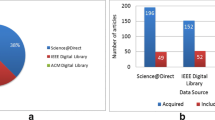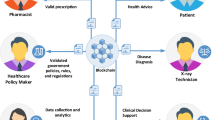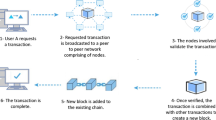Abstract
Blockchain is commonly considered a potential disruptive technology. Moreover, the healthcare industry has experienced rapid growth in the adoption of health information technology, such as electronic health records and electronic medical records. To guarantee data privacy and data security as well as to harness the value of health data, the concept of Health Data Bank (HDB) is proposed. In this study, HDB is defined as an integrated health data service institution, which bears no “ownership” of health data and operates health data under the principal–agent model. This study first comprehensively reviews the main characters of blockchain and identifies the block-chain-based healthcare industry projects and startups in the areas of health insurance, pharmacy, and medical treatment. Then, we analyze the fundamental principles of HDB and point out four challenges faced by HDB’s sustainable development: (1) privacy protection and interoperability of health data; (2) data rights; (3) health data supervision; (4) and willingness to share health data. We also analyze the important benefits of blockchain adoption in HDB. Furthermore, three application scenarios including distributed storage of health data, smart-contract-based healthcare service mode, and consensus-algorithm-based incentive policy are proposed to shed light on HDB-based healthcare service mode. In the end, this study offers insights into potential research directions and challenges.
Similar content being viewed by others
References
Andoni M, Robu V, Flynn D, Abram S, Geach D, Jenkins D, McCallum P, Peacock A (2019). Blockchain technology in the energy sector: A systematic review of challenges and opportunities. Renewable & Sustainable Energy Reviews, 100: 143–174
Babich V, Hilary G (2020). Distributed ledgers and operations: What operations management researchers should know about blockchain technology. Manufacturing and Service Operations Management, 22(2): 223–240
Benniche S (2019). Using blockchain technology to recycle cancer drugs. The Lancet Oncology, 20(6): e300
Chen X (2019). The development trend and practical innovation of smart cities under the integration of new technologies. Frontiers of Engineering Management, 6(4): 485–502
Cheng S F, de Franco G, Jiang H, Lin P (2019). Riding the blockchain mania: Public firms’ speculative 8-K disclosures. Management Science, 65(12): 5901–5913
Chernyshev M, Zeadally S, Baig Z (2019). Healthcare data breaches: Implications for digital forensic readiness. Journal of Medical Systems, 43(1): 7
Constantinides P, Henfridsson O, Parker G G (2018). Introduction—Platforms and infrastructures in the digital age. Information Systems Research, 29(2): 381–400
Dodd B (1997). An independent “Health Information Bank” could solve data security issues. British Journal of Healthcare Computing & Information Management, 14(8): 2
Dolgui A, Ivanov D, Potryasaev S, Sokolov B, Ivanova M, Werner F (2020). Blockchain-oriented dynamic modelling of smart contract design and execution in the supply chain. International Journal of Production Research, 58(7): 2184–2199
Ekblaw A, Azaria A, Halamka J D, Lippman A (2016). A case study for blockchain in healthcare: “MedRec” prototype for electronic health records and medical research data. In: Proceedings of the 2nd International Conference on Open & Big Data. Vienna: IEEE, 1–13
Engelhardt M A (2017). Hitching healthcare to the chain: An introduction to blockchain technology in the healthcare sector. Technology Innovation Management Review, 7(10): 22–34
Felin T, Lakhani K (2018). What problems will you solve with blockchain? MIT Sloan Management Review, 60: 32–38
Gartner (2019). Gartner 2019 Hype Cycle for blockchain business shows blockchain will have a transformational impact across industries in five to 10 years. Available at: gartner.com/en/newsroom/press-releases/2019-09-12
Gerry T, Brett H F (2020). Token-weighted crowdsourcing. Management Science, in press, doi: https://doi.org/10.1287/mnsc.2019.3515
Gold J D, Ball M J (2007). The health record banking imperative: A conceptual model. IBM Systems Journal, 46(1): 43–55
Gong J, Zhao L (2019). Creditworthiness-based service differentiation strategy for health data bank. Procedia Computer Science, 159: 1833–1842
Jia K, Kenney M, Mattila J, Seppala T (2018). The application of artificial intelligence at Chinese digital platform giants: Baidu, Alibaba and Tencent. ETLA Reports, 81
Mao Q (2019). Developing status and system construction of crowd funding insurance system based on blockchain technology. Journal of Xihua University (Philosophy & Social Sciences), 38(2): 67–81 (in Chinese)
Moin S, Karim A, Safdar Z, Safdar K, Ahmed E, Imran M (2019). Securing IoTs in distributed blockchain: Analysis, requirements and open issues. Future Generation Computer Systems, 100: 325–343
Risius M, Spohrer K (2017). A blockchain research framework. Business & Information Systems Engineering, 59(6): 385–409
Shabani M (2019). Blockchain-based platforms for genomic data sharing: A de-centralized approach in response to the governance problems? Journal of the American Medical Informatics Association, 26(1): 76–80
Tan K H, Pang N L, Siau C, Foo Z, Fong K Y (2019). Building an organizational culture of patient safety. Journal of Patient Safety and Risk Management, 24(6): 253–261
Zhou T, Li X, Zhao H (2019). Med-PPPHIS: Blockchain-based personal healthcare information system for national physique monitoring and scientific exercise guiding. Journal of Medical Systems, 43(9): 305
Ziolkowski R, Miscione G, Schwabe G (2020). Decision problems in blockchain governance: Old wine in new bottles or walking in someone else’s shoes? Journal of Management Information Systems, 37(2): 316–348
Author information
Authors and Affiliations
Corresponding author
Additional information
This work was supported by the National Natural Science Foundation of China (Grant No. 71671039).
Rights and permissions
About this article
Cite this article
Gong, J., Zhao, L. Blockchain application in healthcare service mode based on Health Data Bank. Front. Eng. Manag. 7, 605–614 (2020). https://doi.org/10.1007/s42524-020-0138-9
Received:
Accepted:
Published:
Issue Date:
DOI: https://doi.org/10.1007/s42524-020-0138-9




